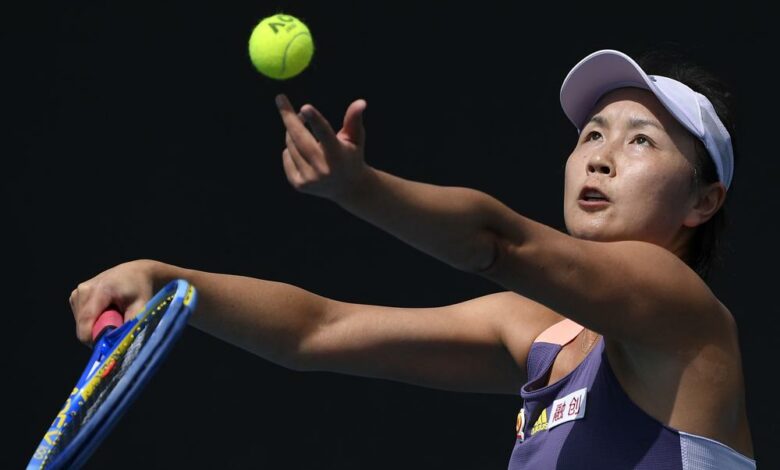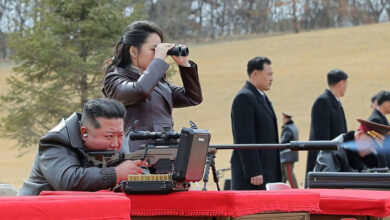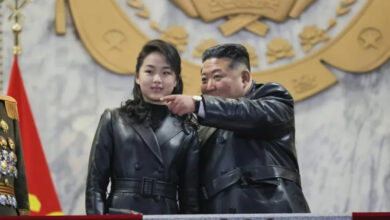
BEIJING (AP) — Nothing to see here, move on.
That was the message that Chinese tennis player Peng Shuai delivered Monday in a controlled interview in Beijing that touched on sexual assault allegations she made against a former high-ranking member of China’s ruling Communist Party. Her answers – delivered in front of a Chinese Olympic official – left unanswered questions about her well-being and what exactly happened.
The interview with French sports newspaper L’Equipe and an announcement that International Olympic Committee President Thomas Bach met Peng for dinner this weekend seemed aimed at defusing sustained international concerns about the three-time Olympian and former No. 1-ranked tennis doubles player. Those concerns have threatened to overshadow the Winter Olympics underway in Beijing.
Peng told L’Equipe that the concerns were the result of “an enormous misunderstanding.” But the format of the interview appeared to allow for no sustained follow-ups, with questions submitted in advance and a Chinese Olympic committee official sitting in on the discussion, translating Peng’s comments from Chinese.
Large parts of the hour-long interview, conducted Sunday in a Beijing hotel and organized through China’s Olympic committee with the IOC’s help, focused on Peng’s playing career. At age 36, and after multiple knee surgeries, Peng said she couldn’t envisage a return to tour-level professional tennis. She hasn’t played on the women’s tour since February of 2020.
The newspaper published her comments verbatim – which it said was another pre-condition for the interview – in question-and-answer form. Photos of Peng during the interview showed her wearing a red tracksuit top with “China” in Chinese characters on the front.
L’Equipe asked Peng about sexual assault allegations that sparked the controversy in November. The allegations were quickly scrubbed from her verified account on a leading Chinese social media platform, Weibo. She subsequently dropped out of public view for a while, leading to “where is Peng Shuai?” questions online and from players and fans outside of China.
In her lengthy post, Peng wrote that Zhang Gaoli, a former vice premier and member of the ruling Chinese Communist Party’s all-powerful Politburo Standing Committee, had forced her to have sex despite repeated refusals. Her post also said they had sex once seven years ago, and that she developed romantic feelings for him after that.
The interview with L’Equipe was her first sit-down discussion with non-Chinese media since the accusation. She walked back the original post.
“Sexual assault? I never said that anyone made me submit to a sexual assault,” the newspaper quoted her as saying.
“This post resulted in an enormous misunderstanding from the outside world,” she also said. “My wish is that the meaning of this post no longer be skewed.”
Asked by L’Equipe why the post disappeared from Peng’s account, she said: “I erased it.”
“Why? Because I wanted to,” she added.
The obvious follow-up question of why she posted in the first place wasn’t asked.
The IOC also worked Monday to defuse the situation. It said Bach dined with Peng on Saturday, a day after Chinese President Xi Jinping opened the Winter Olympics. The IOC said Peng also attended the China-Norway Olympic curling match with IOC member Kirsty Coventry of Zimbabwe.
Speaking in his daily Olympic press conference, IOC spokesman Mark Adams wouldn’t say whether the IOC believes Peng is speaking freely or is under duress
“We are a sporting organization, and our job is to remain in contact with her and, as we’ve explained in the past, to carry out personal and quiet diplomacy, to keep in touch with her, as we’ve done,” he said. “I don’t think it’s for us to be able to to judge, in one way, just as it’s not for you to judge either.”
He said the IOC cannot pass judgement on whether there should be an investigation of her initial allegations.
“I think we can say that we are doing everything we can to make sure that this situation is as it should be,” he said.
In the interview with L’Equipe, Peng did not reply directly to a question about whether she has been in trouble with Chinese authorities since the post. Instead, she responded with a pat-sounding answer that echoed views often expressed by the Chinese government about sport and politics.
“I was to say first of all that emotions, sport and politics are three clearly separate things,” the newspaper quoted her as saying. “My romantic problems, my private life, should not be mixed with sport and politics.”
Asked what her life has been like since the November posting, she replied: “It is as it should be: Nothing special.”
Peng thanked fellow players who expressed concerns about her. They included 23-time Grand Slam champion Serena Williams, who tweeted “we must not stay silent” in November and called for an investigation.
But Peng also expressed bafflement.
“I would like to know: Why so much worry?” she asked. “I never disappeared. It’s simply that many people, like my friends and among them those from the IOC, sent me messages and it was completely impossible to respond to so many messages.”
The women’s professional tennis tour suspended all WTA tournaments in China because of concerns about Peng’s safety. Peng told L’Equipe that a WTA mental health counselling unit sent her emails and a text message.
“That was very unfamiliar to me,” she said. “Why would I need psychological help or that type of thing?”
___
AP journalist Sarah DiLorenzo contributed.
More AP Olympics: https://apnews.com/hub/winter-olympics and https://twitter.com/AP_Sports




